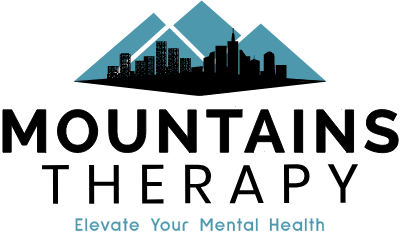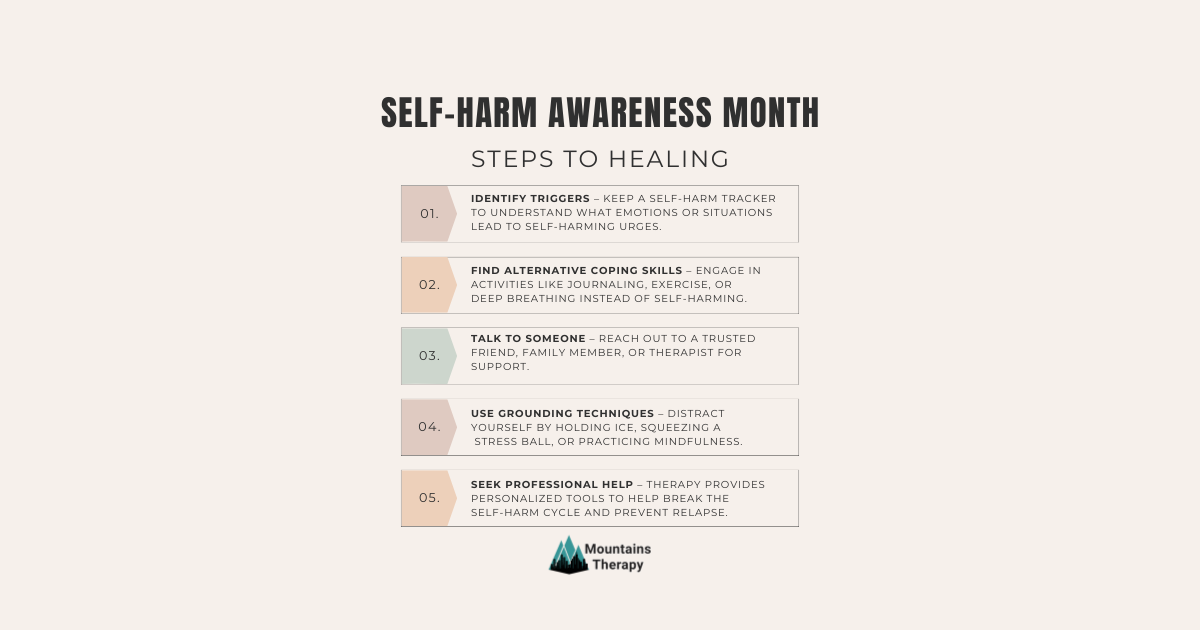Therapy for Self-Harm Thoughts and Treatments to Help with Them
Learn more about Self Harm Therapy.
📞 Suicide Prevention Hotline: Call or Text 988 for Immediate Help
In This Blog, You’ll Learn:
✅ What causes self-harm thoughts
✅ How self-harm affects individuals and families
✅ Effective treatments for self-harm thoughts
✅ Common questions about self-harm answered
✅ How to get professional help at Mountains Therapy NJ
Why Do People Self-Harm?
People who self-harm often use it as a way to express emotions they struggle to articulate, release intense emotional pain, or regain a sense of control over their lives. Common triggers include:
- Emotional Pain: Intense feelings of sadness, anger, or frustration.
- Trauma: Experiences such as abuse, neglect, or the loss of a loved one.
- Mental Health Conditions: Disorders like depression, anxiety, borderline personality disorder (BPD), and post-traumatic stress disorder (PTSD).
Understanding Self-Harm Thoughts
Self-harm thoughts can arise from various underlying issues, including:
- Depression: Persistent sadness, hopelessness, and loss of interest in life can lead to self-harm as a coping mechanism.
- Anxiety and Stress: Overwhelming anxiety and chronic stress may trigger self-harm as a way to manage intense emotions.
- Trauma and PTSD: Individuals who have experienced trauma might turn to self-harm to cope with painful memories.
It’s important to understand that self-harm is not a sign of weakness or attention-seeking. It is a serious symptom that requires compassionate and professional support.
Effective Treatments for Self-Harm Thoughts at Mountains Therapy NJ
At Mountains Therapy NJ, we offer evidence-based treatments to help individuals manage and overcome self-harm thoughts.
1. Cognitive Behavioral Therapy for Self-Harm
- Cognitive Behavioral Therapy (CBT) helps individuals identify and challenge negative thought patterns. CBT focuses on:
- Identifying Triggers: Recognizing situations and emotions that lead to self-harm thoughts.
- Developing Coping Strategies: Learning healthier ways to cope with distress.
- Challenging Negative Thoughts: Replacing harmful thoughts with positive and constructive ones.
- Learn more about CBT for self-harm.
2. Dialectical Behavioral Therapy (DBT)
- Dialectical Behavioral Therapy (DBT) is specifically designed for individuals struggling with self-harm and emotional regulation. It focuses on:
- Emotion Regulation: Techniques to manage intense emotions.
- Distress Tolerance: Building skills to handle distress without resorting to self-harm.
- Interpersonal Effectiveness: Enhancing relationships and communication skills.
- Learn more about DBT for self-harm.
3. Mindfulness Therapy for Self-Harm
- Mindfulness-Based Therapy (MBT) encourages staying present with a non-judgmental awareness of thoughts and feelings. It helps:
- Increase Self-Awareness: Understanding thoughts and feelings without judgment.
- Reduce Stress: Techniques to reduce overall stress and anxiety.
- Improve Emotional Regulation: Learning to manage emotions in a healthy way.
- Learn more about mindfulness for self-harm.
4. Trauma-Focused Cognitive Behavioral Therapy (TF-CBT)
- For those whose self-harm thoughts are linked to past trauma, TF-CBT can be highly effective. It focuses on:
- Processing Trauma: Helping individuals make sense of traumatic experiences.
- Building Coping Skills: Developing skills to manage trauma-related distress.
- Creating a Supportive Environment: Involving family or loved ones in the healing process.
- Learn more about TF-CBT for trauma and self-harm.
Common Questions About Self-Harm: Answered
- Are self-harm intrusive thoughts normal? Yes, they can arise from high stress, trauma, or mental health challenges, but support is available.
- Can self-harm be mental? Yes, it includes self-critical thoughts, self-sabotaging behaviors, and engaging in harmful habits.
- Can self-harm scars be removed? While they may not completely disappear, treatments like laser therapy and skincare can help reduce their appearance.
- Can self-harm be a compulsion? Yes, it can become a compulsive behavior, especially in cases of OCD or emotional distress.
- Can self-harm cause PTSD? While self-harm itself does not cause PTSD, underlying trauma may contribute to PTSD symptoms.
- Can self-harm be a coping mechanism? Yes, but healthier coping strategies can be developed through therapy.
- How is self-harm treated? Treatments include CBT, DBT, mindfulness therapy, and trauma-focused therapy.
- How long until self-harm scars go away? Healing varies by severity, skin type, and treatment used.
- How does self-harm affect someone? It can lead to physical injuries, emotional distress, and strained relationships.
- How does self-harm affect family? Families may feel confused, fearful, or helpless, but therapy can help improve understanding.
- What is self-harm treatment? A combination of therapies to address underlying issues and provide coping skills.
- What is a self-harm tracker? A tool (app or journal) to monitor triggers, patterns, and progress.
- What counts as self-harm? Any intentional self-injury, including physical harm, substance abuse, or reckless behavior.
- When is self-harm a problem? When it becomes a coping mechanism, interferes with life, or poses health risks.
Seeking Professional Counseling at Mountains Therapy NJ
If you or someone you know is struggling with self-harm thoughts, seeking professional help is a crucial step. At Mountains Therapy NJ, we provide compassionate and effective support tailored to each individual's needs, including those in LGBTQIA2S+ and BIPOC communities. To learn more about our services or to schedule an appointment, please visit our contact page. We offer a free initial phone consultation to discuss your needs and how we can support you on your healing journey.
You Are Not Alone - Help is available
If you or someone you know is in immediate danger, please call 988, 911, or go to the nearest emergency room. Support is available, and recovery is possible.














